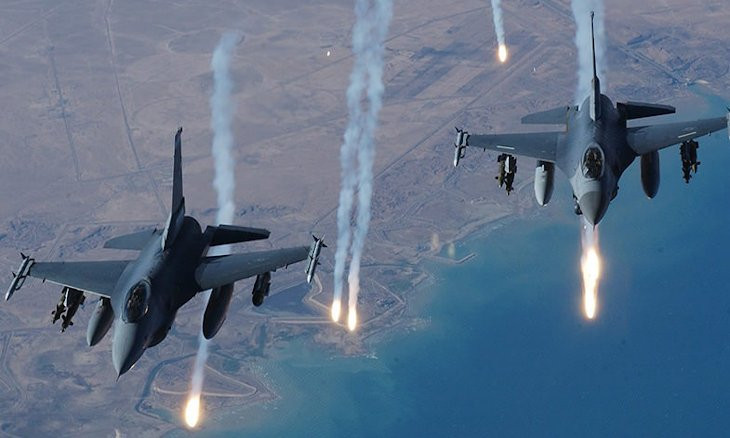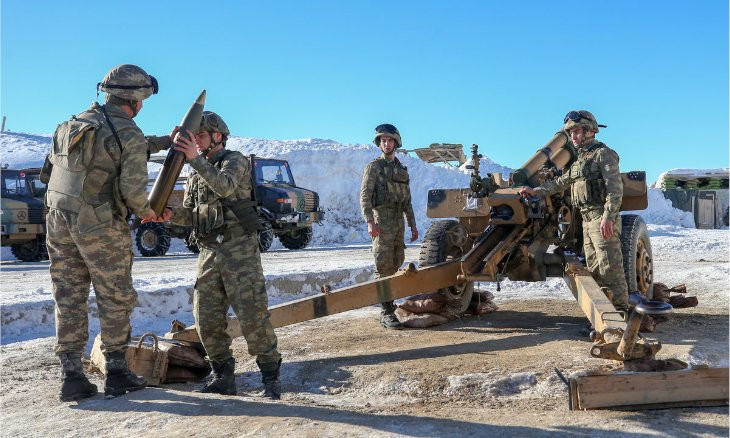Iraq cancels Turkish Defense Minister Akar's visit, summons ambassador
Iraq cancelled on Aug. 11 Turkish Defense Minister Hulusi Akar's visit to the country which was scheduled for Aug. 13, Iraq's foreign ministry said in a statement following the death of two Iraqi border guards as a result of a Turkish drone strike. The ministry also summoned the Turkish ambassador to hand him "a strong protest note and inform him of Iraq’s confirmed rejection of his country's attacks and violations," the statement added.
Duvar English - Reuters
Iraq cancelled on Aug. 11 Turkish Defense Minister Hulusi Akar's visit to the country which was scheduled for Aug. 13, Iraq's foreign ministry said in a statement.
The ministry also summoned the Turkish ambassador to hand him "a strong protest note and inform him of Iraq’s confirmed rejection of his country's attacks and violations," the statement added.
A Turkish drone strike on Aug. 11 in the Sidakan area in northeastern Iraq, near the Turkish and Iranian borders, killed two members of Iraq's border guard and the driver of the vehicle they were in, the Iraqi military said, as it also called the attack "a flagrant aggression."
The drone strike happened as the officers “were in meetings with” members of the Kurdistan Workers’ Party (PKK), Ihsan al-Chalabi, mayor of Sidekan, was quoted by Rudaw as saying.
 Turkish drone kills 2 Iraqi border guards in Kurdish region, Iraq's military says
Turkish drone kills 2 Iraqi border guards in Kurdish region, Iraq's military says“We have two martyrs, Brigadier. Mohammed Rashid and Brigadier. Zubair Hali. They were hit by an airstrike in Bermi Dindaran area [in Bradost],” said Lieutenant Colonel Muhsin Aziz of the Iraqi border forces.
“One [PKK] fighter was killed – his name was Ageed and was high-ranking… he was with Brigadier Zubair and the other brigadier,” said witness Attam Bas.
The majority of Iraq’s border forces stationed in the Kurdistan Region are Kurdish, with some Arab and Turkmen members. The forces have been stationed in the province since 2003.
The airstrikes follow renewed Turkish offensives in the Kurdistan Region.
Turkey launched new operations in the Kurdistan Region and disputed territories in mid-June. Air offensive Operation Claw-Eagle began on June 15, with a ground offensive, dubbed Operation Claw-Tiger, launched on June 17.
Yehia Rasool, spokesperson for the commander-in-chief of the Iraqi Armed Forces urged Turkey to "hold accountable" those involved in the drone attack and clarify the circumstances around committed "the crime," in order to "preserve good neighborliness and relations between the two countries," in a tweet late Aug. 11.
KRG urges Turkey to take conflict outside Kurdistan Region
In a separate statement, the Kurdistan Regional Government’s (KRG) Interior Ministry urged Turkey and the PKK to "take your conflicts and rivalries outside of the land of the Kurdistan Region and Iraq and that no longer victimize our people amidst this conflict."
"We assure our people that the Kurdistan Regional Government as always will exert maximum efforts to push away this rivalry from the Kurdistan Region," read the ministry statement.
Iraq labelled Turkey's ground and aerial attacks as a "clear violation of international laws and charters and good neighborly relations and we condemn these aggressive acts."
 Human Rights Watch says Turkish airstrikes in Iraq disregard civilian losses
Human Rights Watch says Turkish airstrikes in Iraq disregard civilian lossesBaghdad urged an "immediate cessation of these attacks" and called on Turkey to resort to "dialogue" for the resolution of the "border problems."
The Iraqi foreign ministry has previously summoned the Turkish ambassador to Baghdad twice, but this has failed to de-escalate the tensions or halt Turkey’s offensive.
"These issues must be resolved in a manner that preserves the security and stability of the region," the Iraqi presidency's statement said.
 Iraq accuses Turkey of violating 2007 security pact with recent offensive
Iraq accuses Turkey of violating 2007 security pact with recent offensive
